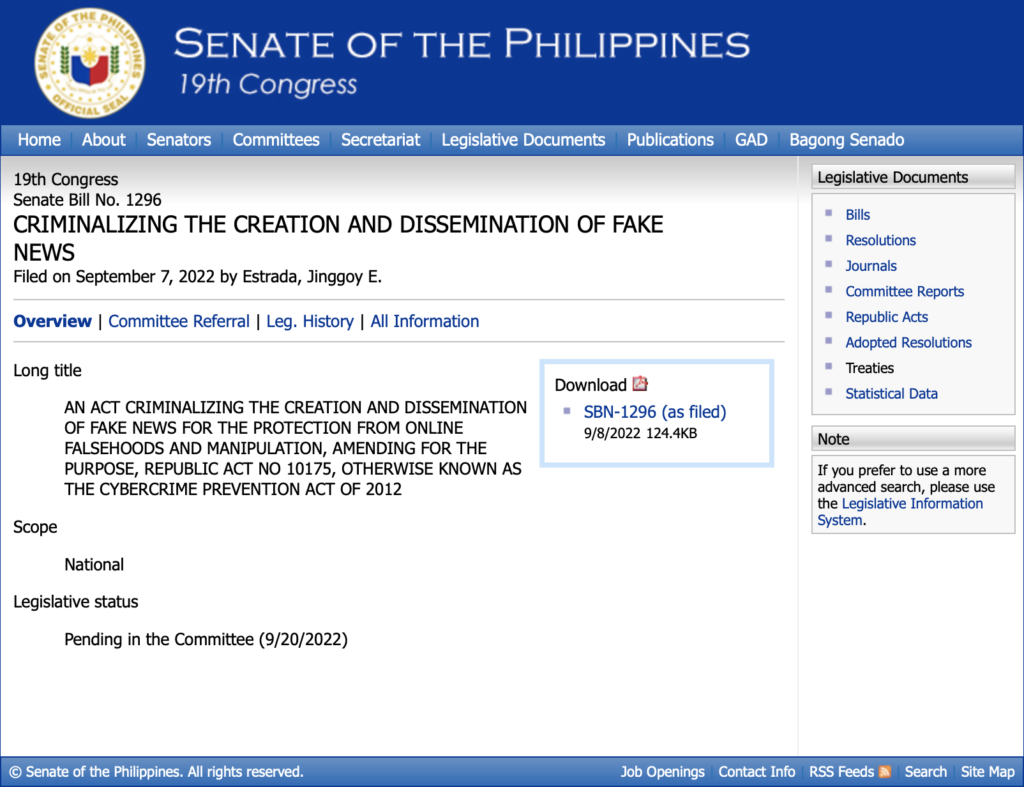(PHILSTAR) MANILA, Philippines (Updated 3:25 p.m.) — Sen. Jinggoy Estrada has filed a bill that seeks to make creating and spreading “fake news” a crime punishable under the Cybercrime Prevention Act of 2012.
Under Senate Bill No. 1296, Estrada defines fake news as “misinformation and disinformation of stories, facts and news which is presented as a fact, the veracity of which cannot be confirmed, with the purpose of distorting the truth and misleading its audience.”

“Ang mga clickbaits, propaganda at pagmamanipula ng mga lehitimong news segments para makapagpalaganap ng kasinungalingan, maling balita o disinformation ay pangkaraniwan na ngayon kaya mahirap na matukoy kung alin ang totoo sa mga pekeng balita. Masyado ng talamak ang mga ito,” Estrada said in a statement.
(Clickbaits, propaganda and manipulating legitimate news segments to spread lies, false news or disinformation is now common which is why it’s hard to determine what is true from fake news. This is too chronic.)
The measure seeks to make the creation and dissemination of fake news a content-related offense under the anti-cybercrime law, but is not clear on the penalties it wants to impose.
Estrada’s office said penalties provided under the anti-cybercrime act will apply, but the said law does not provide any punishment for creating and spreading fake news, which will be an entirely new crime that will be introduced in Philippine statutes.
National Union of Peoples’ Lawyers president Edre Olalia told Philstar.com in a text message that offhand, punishing fake news purveyors is a “good idea,” but there are “rough edges” that must be addressed.
Among these include the presence or absence of intent, liability of public officers and/or their agents, Olalia said.
He added: “It must be tweaked thoroughly because it looks too broad and might be used against critics & dissenters.”
Digital Pinoys national campaigner Ronald Gustilo told Philstar.com that while they support all efforts to quash fake news, “the proposed amendment must still ensure that opinion and personal views will be respected and the universal right to free speech be upheld.”
Prone to misuse?
This is the latest attempt to punish the spreading of fake news online — a scourge that policymakers have long sought to address.
At the start of the COVID-19 pandemic in 2020, the government enacted the Bayanihan to Heal as One Act which punished creating and spreading false information on the COVID-19 crisis on social media and other platforms.
Those found in violation of this provision may face two months imprisonment or a fine of not less than P10,000. Courts may also impose a fine of up to P1 million.
Back then, Olalia said the provision is “constitutionally challengeable as undermining or curtailing freedom of speech, expression.”
Human Rights Director Deputy Asia Director Phil Robertson also said the provision is “over-broad and can easily be misused by Philippine authorities to crack down on online criticism of government efforts.”
Robertson noted that the law can be used to “criminalize any online information the government dislikes.” -Xave Gregorio/Philstar — with a report from Kristine Joy Patag

